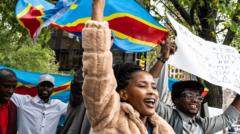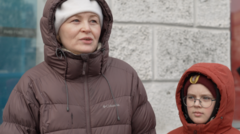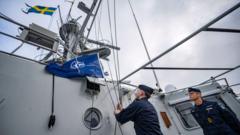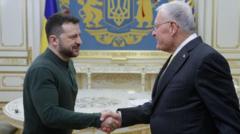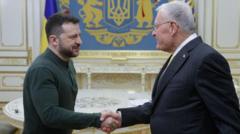Rebel groups, primarily Hayat Tahrir al-Sham (HTS), have claimed substantial gains against the forces loyal to President Bashar al-Assad, resulting in heightened confrontations with reported casualties on both sides.
Syria's Rebels Launch Offensive Amidst Escalating Conflict in the North-West
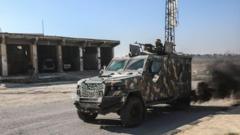
Syria's Rebels Launch Offensive Amidst Escalating Conflict in the North-West
The Syrian rebel forces have initiated a major offensive in the northwest region, capturing significant territory from the government amid continuous violence.
In a significant development in the ongoing Syrian conflict, rebel fighters, particularly from Hayat Tahrir al-Sham (HTS) and allied factions, have launched a major offensive aimed at seizing territory from President Bashar al-Assad's forces, marking a considerable shift in the dynamics of the war. The offensive, which began on Wednesday in the northwest regions of Aleppo and Idlib, has led to the capture of several towns and villages, according to rebel claims.
The Syrian military has responded to the uprising by asserting that it is confronting a “large-scale” attack involving “terrorists,” insisting that it has inflicted heavy losses on the rebels. Reports from the UK-based Syrian Observatory for Human Rights indicated that more than 180 combatants from both the government and rebel factions have died in this latest round of fighting. Additionally, at least 19 civilians have been reported killed due to air strikes conducted by Syrian and Russian forces on areas held by the opposition.
The Syrian civil war, now in its twelfth year, has left over half a million people dead since it ignited after a government crackdown on peaceful pro-democracy protests in 2011. Idlib province, the last major opposition stronghold, remains home to about 4 million displaced individuals living under dire conditions. While HTS largely controls Idlib, there are also Turkish-backed factions operating under the Syrian National Army, together with Turkish military presence in the region.
A ceasefire brokered by Turkey and Russia in 2020 had brought a temporary halt to hostilities, yet violence has sporadically resurfaced despite the lull. Recent geopolitical dynamics, particularly conflicts in neighboring Lebanon and ongoing Israeli air strikes in Syria, appear to be exacerbating tensions in the region. The UN special envoy for Syria recently expressed concerns that these external conflicts could further ignite violence in northwest Syria.
As the offensive commenced, HTS and its allies justified their actions as a means of “deterring aggression” from the government and countering its escalating military plans alongside Iran-backed militias. Amid the chaos, Iranian military officials have also reportedly been active in Syria, with one senior commander confirmed killed during the fighting.
The first day of the offensive saw significant territorial advancement for the rebels, reportedly coming within 10 kilometers of Aleppo city. They have also disrupted the M5 highway, a critical route linking Aleppo to the capital, Damascus. Civilian casualties have continued to mount, with the International Rescue Committee reporting almost 7,000 families displaced as air strikes violently impacted residential neighborhoods, exacerbating an already dire humanitarian situation.
With the violence escalating, calls for an "immediate de-escalation" of the conflict have intensified from various humanitarian organizations, emphasizing the need to protect civilians and crucial infrastructure amidst renewed fighting.
The Syrian military has responded to the uprising by asserting that it is confronting a “large-scale” attack involving “terrorists,” insisting that it has inflicted heavy losses on the rebels. Reports from the UK-based Syrian Observatory for Human Rights indicated that more than 180 combatants from both the government and rebel factions have died in this latest round of fighting. Additionally, at least 19 civilians have been reported killed due to air strikes conducted by Syrian and Russian forces on areas held by the opposition.
The Syrian civil war, now in its twelfth year, has left over half a million people dead since it ignited after a government crackdown on peaceful pro-democracy protests in 2011. Idlib province, the last major opposition stronghold, remains home to about 4 million displaced individuals living under dire conditions. While HTS largely controls Idlib, there are also Turkish-backed factions operating under the Syrian National Army, together with Turkish military presence in the region.
A ceasefire brokered by Turkey and Russia in 2020 had brought a temporary halt to hostilities, yet violence has sporadically resurfaced despite the lull. Recent geopolitical dynamics, particularly conflicts in neighboring Lebanon and ongoing Israeli air strikes in Syria, appear to be exacerbating tensions in the region. The UN special envoy for Syria recently expressed concerns that these external conflicts could further ignite violence in northwest Syria.
As the offensive commenced, HTS and its allies justified their actions as a means of “deterring aggression” from the government and countering its escalating military plans alongside Iran-backed militias. Amid the chaos, Iranian military officials have also reportedly been active in Syria, with one senior commander confirmed killed during the fighting.
The first day of the offensive saw significant territorial advancement for the rebels, reportedly coming within 10 kilometers of Aleppo city. They have also disrupted the M5 highway, a critical route linking Aleppo to the capital, Damascus. Civilian casualties have continued to mount, with the International Rescue Committee reporting almost 7,000 families displaced as air strikes violently impacted residential neighborhoods, exacerbating an already dire humanitarian situation.
With the violence escalating, calls for an "immediate de-escalation" of the conflict have intensified from various humanitarian organizations, emphasizing the need to protect civilians and crucial infrastructure amidst renewed fighting.

